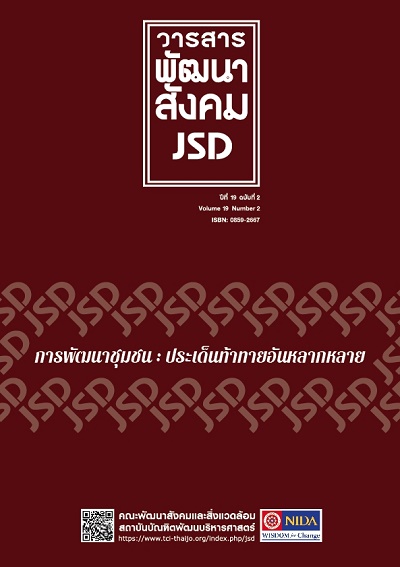บทความวิจัย การรณรงค์เชิงกลยุทธ์เพื่อเพิ่มประสิทธิผล การจัดการขยะในครัวเรือน ในอำเภอแกลง จังหวัดระยอง
Main Article Content
Abstract
การวิจัยครั้งนี้มีวัตถุประสงค์เพื่อศึกษาการใช้กิจกรรมการรณรงค์เชิงกลยุทธ์ในการเพิ่มประสิทธิผลการจัดการขยะในครัวเรือน โดยมุ่งเป้าหมายไปที่การให้ความรู้ที่ถูกต้อง ปรับเปลี่ยนทัศนคติ และส่งเสริมการปฏิบัติให้เกิดขึ้นอย่างเหมาะสมกับปัญหาและบริบทของท้องถิ่น มีการนำรูปแบบวิธีการในการจัดการขยะในครัวเรือนที่ประสบความสำเร็จมาปรับใช้ในพื้นที่กลุ่มทดลอง ซึ่งใช้วิธีการวิจัย 2 วิธีหลัก คือ การวิจัยเชิงปฏิบัติการแบบมีส่วนร่วม (Participatory Action Research: PAR) และวิธีการวิจัยแบบกึ่งทดลอง (quasi Experimental Research) โดยใช้สื่อและกิจกรรมเพื่อทำการรณรงค์เชิงกลยุทธ์ในการเพิ่มประสิทธิผลการจัดการขยะในครัวเรือน ผลการศึกษาพบว่า หลังจากมีการวางแผนและการรณรงค์การจัดการขยะแบบมีส่วนร่วมแล้ว ประชาชนมีความรู้เพิ่มขึ้น มีทัศนคติเชิงสร้างสรรค์มากขึ้น และเกิดการปฏิบัติที่ถูกต้องเหมาะสมกับสภาพแวดล้อมและวิถีชุมชน รูปแบบของกระบวนการการมีส่วนร่วมที่องค์กรปกครองส่วนท้องถิ่น ภาคเอกชนและประชาชนเข้ามาร่วมคิดและร่วมทำนั้นช่วยสร้างความสัมพันธ์และความร่วมมือซึ่งกันและกัน ทำให้งานบรรลุเป้าหมาย โดยมีเงื่อนไขแห่งความสำเร็จ คือ การวิเคราะห์หาสาเหตุของปัญหาที่แท้จริง การผลิตและใช้สื่อให้ตรงกับสภาพปัญหาของบุคคลผู้รับสื่อ และการใช้สื่อรณรงค์อย่างมุ่งเน้นเป้าหมายและต่อเนื่อง
This research is aimed at investigating the strategies used for campaign in order to increase the efficiency of household waste management. The goals of using these activities were to provide accurate knowledge, adjust attitude and enhance solutions suitable for the problems with the local contexts. A model of successful household waste management methods was brought into the study area and applied as an experiment. Two main research methods were adopted in this research operation – participatory action research and experiment. The quasi experimental research emphasized on the use of media and activities for strategic campaigning to increase the household waste management efficiency. The results revealed that after planning and campaigning to enhance the participation on the waste management people’s knowledge increased; they had more open attitude. Accurate as well as appropriate practices were adopted suitable for the local community and the environment. Patterns of participatory process resulted from mutual efforts of local administrative organization, private sector and local people operational in building relations and cooperation between different parties. Consequently, the campaign was successful. Conditions of this achievement included analysis of factors causing problems, production and utilization of media suitable for problems faced by receivers, and consistent and continuous use of media in campaigning.


